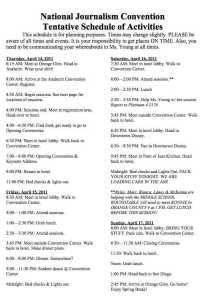Attending a state, regional or national journalism convention can be a highlight of the school year for the students and teachers who attend.
Preparing for a successful trip requires additional planning on the part of teachers — including booking transportation and hotel rooms, collecting permission forms, and getting travel to the event approved by the school administration and/or the school board.
The JEA mentors offer some advice on two important aspects that help determine how successful attending the convention was.
- Developing guidelines and requirements to help the students attending the convention be productive and safe.
- Developing plans and activities for the students on the media staffs who aren’t attending the convention and will be at school to be productive.
Bill Flechtner (Oregon)
I always gave my students the assignment to take notes at all sessions they attended and turn them into me. I expected them to attend a minimum number of sessions each day.
The expectation was also that they would meet with me at certain appointed times each day. For instance, prior to the first sessions on Friday. No excuses for being late. If failure to meet me at these times, they faced the prospect of going with me to events for the next several hours.
We also did group evening things that were planned well in advance of the trip. There were no excuses for not being a part of the group activities.
However, I seldom did group meals. Arriving at one meal choice was an almost impossible task, so meals were on their own before or after the group meetings during the day.
At school, those that were not going were given specific tasks that they needed to have accomplished in the time we were gone. It could be simply cleaning the computer files or preparing page designs for the next issue or completing certain assignments. This varied depending on the students and where we were in the production cycle.
 Konnie Krislock (California)
Konnie Krislock (California)
She shares these materials from Jessica Young, one of her mentees:
Schedule for convention (see her schedule from the JEA/NSPA convention in Anaheim from last spring). Each student receives a copy of the schedule, which includes convention sessions, where and when to meet for group meals, and curfew,
Packing List – Mandatory items included school-appropriate outfits for four days, pen/pencil and paper, bookpack, school ID, cell phone and charger, comfortable shoes, publication staff shirt, and money. Optional items included camera, laptop, water bottle, snacks, copies of publication, bathing suit, and clothes for the dance. The list also included the adviser’s and chaperone’s phone numbers and email addresses, hotel information, and the hotel rooming assignments.
Carol Smith (Illinois)
One adviser at our fall institute said that she has her students take the online Poynter courses while she is gone. Poynter’s NewsU has more than 70 free courses that students can take online. The student just needs to create a free NewsU account. After taking a course, the student can have NewsU send a course report to the teacher.
Some favorite courses include “Cleaning Your Copy” for practice with grammar and AP style, “First Amendment for the High School Journalist,” and “Be a Reporter Game” that lets students see how a story unfolds through reporting. Courses are available for improving listening, understanding how to edit audio, and creating multimedia.
Katy Gray (Colorado)
To plan for students left at the school, I have saved the lessons that go with journalism-based movies like “Shattered Glass.” “All the President’s Men,” “Absence of Malice” or “Newsies.” I had collected lesson plans from Journalism Education Today and searched the Internet for what else I could find. Journalists who could not attend would not feel as left out and other disciplines I taught could benefit from a tweaking of the plans to suit their class.
I asked my students who attended to take enough notes to be able to share two new ideas with the journalism class that could be implemented when they returned. This would give them focus for their notes.
I would schedule a time and place to meet at noon to touch base and of course, talk with them before they left their rooms for the day and when they returned in the evening. We would always spend time sharing what sessions were really good, what they picked up that day. And I would ask them when they got excited explaining something, “Did you write that down so you’ll remember when we get back to school?”
Encourage students to attend different classes. When you always go as a pack, it is tempting to focus on the social aspect of the pack, not new ideas that take some absorbing. I let students go in pairs if they could convince me that they had a specific question they were seeking an answer for.
New advisers should pick up sample newspapers from all over the country even if they have to mail them back to their school in lieu of carrying them in their luggage. You can always get an idea or two for a story or a new way of laying out a page.
***
If you have other tips for having a successful group trip to a journalism conference, I’d like to share those tips on the blog. Please email them to me a 2jodd (at) gmail (dot) com.
